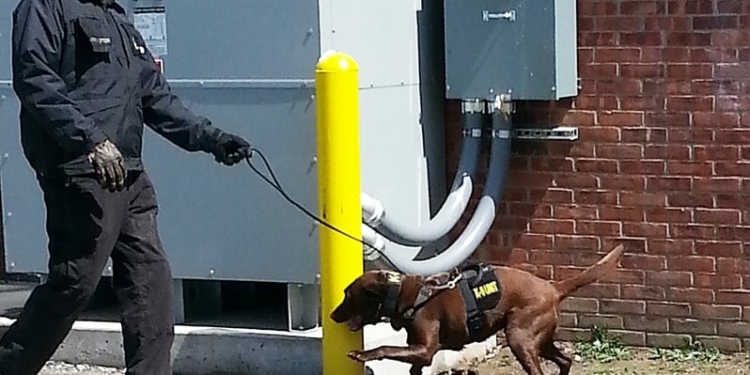If someone had asked retired police officer Dave Harrington years ago if he’d like to become a K9 handler, the answer would have been yes. The problem was, and is, funding. Most local law enforcement agencies can’t afford their own dogs, and when one is needed, they have to call in the county sheriff’s department or state police. The Bethlehem Police Department hasn’t had a dog since the early 2000s. “I’d been involved with a lot of the training sessions, but I’d never handled a dog in that capacity until I reached out myself,” said Harrington. A former Bethlehem Police officer and D.A.R.E instructor, Harrington started his company, Specialized K9 Detection Service, in 2013. He was still on the police force at the time but knew he was going to retire soon. He began doing research on certifications and soon bought his first dog, Willie, from a kennel in North Carolina. By that time, Harrington was committed. The dogs, which come fully trained and already imprinted with the scents of specific drugs, cost between $7,000 and $10,000 each. Harrington then hired his friend, Aaron, to prevent any conflicts of interest until he eventually retired a few months later. He soon bought a second dog, Stone. Both of the dogs are four years old. “This wasn’t meant to be a retirement plan,” said Harrington. “It’s just something I’ve wanted to do. It’s not really about the money but helping people.” In recent years, heroin has become a growing concern for not only the Capital District, but the entire state. According to Attorney General Eric Schneiderman, Albany County ranks sixth in the state for opioid hospitalizations, and more than 2,000 residents have died from overdoses in New York since 2011. Harrington said the majority of his contracts are with businesses who want to make sure drugs aren’t being brought into work. Very rarely is anything found in these instances, he said. However, when dealing with residential clients, 95 percent of the cases involve heroin. “I thought there would be more nosey parents out there who would want to know if their kids are smoking weed, but that isn’t the case,” said Harrington. All of the company’s sessions are confidential and performed without informing law enforcement. Police are only called if there is a public safety issue or if illegal weapons have been found. Harrington said that addiction is a difficult problem to tackle, but the first step is finding out if there is a problem in the first place — that’s where he and his dogs come into play. “We’re beginning to learn now that jail time doesn’t work for an addict,” said Harrington. “There are often times they are still able to get drugs in jail, which is a whole other issue, and they come back just as addicted as they went in.” The problem is, Harrington said, often people are scared to call the police for help or advice. If they do, they are afraid to give their names because of the likelihood a friend, family member or themselves will be arrested. “People are concerned the information will get out,” said Harrington. “They’re (worried) about their safety and their children’s, but more worried about what the neighbor will think. So many times, their biggest concern is ending up in the newspaper.” Most searches are done when the suspected user is out of the house. Before a visit, Harrington extensively interviews those living in the house who have concerns, but doesn’t ask where they suspect drugs are hidden. This helps to ensure the dog’s reactions are genuine. One dog is then brought through the home or business, followed by another search by the second dog to promote accuracy. When the search is complete, Harrington provides a list of resources for the family or business owner. This can be anything from counselors to rehabilitation facilities. Harrington also offers to speak with the user if drugs are found. “It’s very sad sometimes, and you want to know how the person got to that point,” said Harrington. Authorities are now working hard to fight the epidemic.
In June, Gov. Andrew Cuomo launched his “Combat Heroin” campaign. The effort was meant to increase the availability to naloxone, a medication that reverses an opioid overdose. It also provided more support for parents, insurance reforms for those seeking treatment and decriminalized drug use for those who call in seeking help for an overdose victim. Harrington said his business has become a success, and he is glad his services are being used to help others. A production company recently contacted him to shoot a pilot for a reality television show. The first episode will likely be shot in the near future, but there’s no guarantee it will be picked up to air. “I think the thought is for it to be something like ‘Intervention,’” said Harrington. “Participants could be blurred out if they wish, but how it goes is up to the production company.” If the show is picked up, Harrington said he would be searching for new clients who won’t mind being filmed. If that were the case, services would be provided for free. To learn more, visit www.labsfindingdrugs.com.
On the front line of an epidemic
Leave Comment



